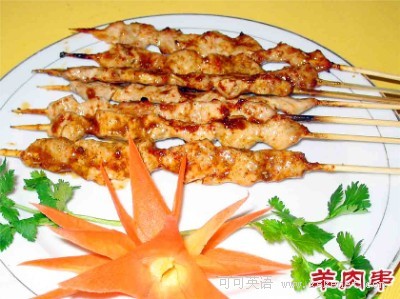
4. Are the ingredients fresh? If you've got eyes, a nose, and some tastebuds, you can figure this out for yourself. I look at the condiments and garnishes to determine if I want to eat at a given stand or cart. If I see crusty bowls of salsa, dessicated limes, slimy herbs, or flies congregated on any raw foods I might potentially eat, I'm out of there.
4гҖҒеҺҹж–ҷжҳҜеҗҰж–°йІңпјҹдҪ еҸҜд»Ҙз”ЁдҪ зҡ„зңјзқӣгҖҒйј»еӯҗе’Ңе‘іи•ҫжқҘеҲҶиҫЁгҖӮжҲ‘дјҡе…ҲзңӢзңӢж‘Ҡиҙ©зҡ„и°ғе‘іе“Ғе’Ңй…ҚиҸңпјҢеҶҚжқҘеҶіе®ҡжҳҜеҗҰиҰҒеңЁзү№е®ҡзҡ„ж‘ҠдҪҚжҲ–жҺЁиҪҰеҗғдёңиҘҝгҖӮеҰӮжһңжҲ‘зңӢеҲ°йӮӢйҒўзҡ„жІҷжӢүгҖҒе№Іе№Ізҡ„й…ёж©ҷгҖҒзІҳзІҳзҡ„йҰҷж–ҷпјҢжҲ–жҳҜжҲ‘жғіеҗғзҡ„йЈҹзү©еҺҹж–ҷдёҠеҒңзқҖиӢҚиқҮпјҢжҲ‘马дёҠзҰ»ејҖйӮЈйҮҢгҖӮ
If you're in a coastal region, it pays to do a bit of homework on the cleanliness of the local fresh and ocean water supplies; algae blooms or cholera outbreaks will be widely reported. Try to avoid eating raw river fish or seafood, or river fish/seafood from just offshore; remember that many developing island nations and coastal regions use high tide as their toilet. If you're eating pork in the Third World, always make sure it's well-cooked. While trichinosis has effectively been eradicated from our domestic industrial pork supply, the disease is prevalent in other parts of the world. And not to get too graphic, but you'll often find pigs in rural parts of the developing world lurking around latrines, searching for a snack.
еҰӮжһңдҪ еңЁжІҝжө·ең°еҢәпјҢдҪ е°ұиҰҒеҜ№еҪ“ең°зҡ„дәӢзү©жңүжүҖдәҶи§ЈпјҢеҰӮе№ІеҮҖж–°йІңзҡ„жө·дә§е“ҒгҖҒж°ҙи—»пјҢд»ҘеҸҠе№ҝжіӣжҠҘйҒ“зҡ„йңҚд№ұз–«жғ…гҖӮе°ҪйҮҸйҒҝе…Қеҗғз”ҹжІійұјжҲ–жө·йІңжҲ–иҝ‘жө·ең°еҢәзҡ„жө·дә§е“ҒгҖӮиҰҒи°Ёи®°пјҢи®ёеӨҡеҸ‘еұ•дёӯеІӣеӣҪе’ҢжІҝжө·ең°еҢәд»Ҙжө·жҪ®дҪңдёә他们зҡ„еҺ•жүҖгҖӮеҰӮжһңдҪ еңЁз¬¬дёүдё–з•ҢеҗғзҢӘиӮүпјҢдёҖе®ҡиҰҒзЎ®дҝқиӮүе·Із…®зҶҹпјҢиҷҪ然еӣҪеҶ…зҡ„зҢӘиӮүдҫӣеә”е·Ҙдёҡе·Іжңүж•Ҳж №йҷӨдәҶжҜӣзәҝиҷ«з—…пјҢдҪҶиҜҘз–ҫз—…иҝҳжҷ®йҒҚеӯҳеңЁдәҺдё–з•Ңе…¶е®ғең°еҢәгҖӮдҪҶд№ҹдёҚиҰҒеӨӘ讲究еҪўиұЎпјҢеңЁеҸ‘еұ•дёӯеӣҪ家зҡ„еҶңжқ‘ең°еҢәдҪ з»ҸеёёдјҡзңӢеҲ°зҢӘеӣҙеңЁеҺ•жүҖе‘Ёеӣҙи§…йЈҹгҖӮ
Fresh ingredients don't necessarily mean great food, but it helps. Delicious street food is ulimately a reflection of the loving care that goes into its preparation. Are the carnitas slightly crispy on the outside, with an interior succulent with greasy goodness? Is the masa in the tamales moist, with a sweet, earthy corn flavor? Are the noodles slightly toothsome, the herbs fresh and bright-tasting, the broth fragrant and piping hot? These things matter.
ж–°йІңзҡ„йЈҹжқҗ并дёҚж„Ҹе‘ізқҖеҘҪеҗғпјҢдҪҶеҚҙжңүзӣҠгҖӮзҫҺе‘ізҡ„иЎ—еӨҙйЈҹзү©жҳҜдёҖз§ҚзІҫеҝғеҮҶеӨҮзҡ„дәІеҲҮе…іжҖҖгҖӮcarnitasеӨ–иЎЁз•Ҙи„ҶпјҢйҮҢйқўеҚҙеӨҡжұҒжІ№и…»еҗ—пјҹж№ҝж¶Ұзҡ„зҺүзұізІүи’ёиӮүе……ж»ЎзқҖжіҘеңҹзҡ„ж°”жҒҜпјҹзҫҺе‘ізҡ„йқўжқЎгҖҒжё…ж–°дә®дёҪзҡ„йҰҷиҚүгҖҒз”ңзҫҺзҡ„зғӯиӮүжұӨпјҹиҝҷдәӣйғҪжҳҜдҪ иҰҒе…іеҝғзҡ„й—®йўҳгҖӮ














